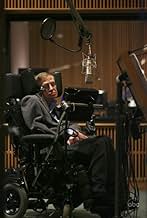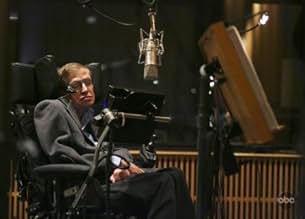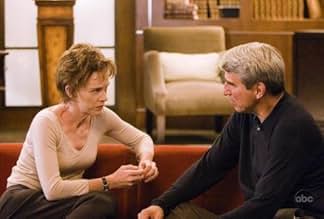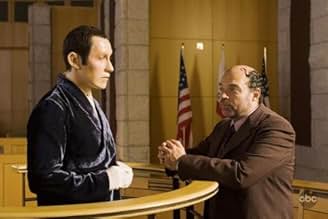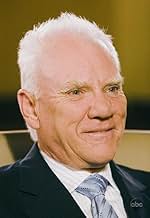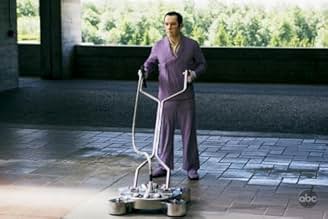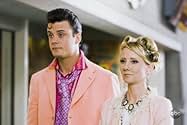Masters of Science Fiction
- TV Series
- 2007
- 42m
IMDb RATING
6.7/10
2.3K
YOUR RATING
"Masters of Science Fiction" was a 2007 hosted science fiction anthology series, hosted by Stephen Hawking."Masters of Science Fiction" was a 2007 hosted science fiction anthology series, hosted by Stephen Hawking."Masters of Science Fiction" was a 2007 hosted science fiction anthology series, hosted by Stephen Hawking.
- Nominated for 1 Primetime Emmy
- 2 nominations total
Browse episodes
Featured reviews
It's not different by much, except it's not nearly as good. The pre-show hype from ABC was that it was the best series since the TWILIGHT ZONE. They must have been writing that hyperbole with their heads in the Twilight Zone.
The narrator is Stephen Hawking, using his quasi-mechanical voice, but otherwise just like an Outer Limits episode. That isn't terrible in itself, but certainly not original.
The opening and titles sequences are modernized with fancy graphics, etc, otherwise they are similar. Narration ends with a warning or social observation, similar to Outer Limits, yet more heavy-handed.
The first episode shown was obviously the program's producers and writers attempt at topical political statement, and as such it was ham-fisted and preachy, and ludicrous as well, and about as topical as the Berlin wall. The recent Outer Limits series also had a political bent, yet was often more subtle and earnest in presentation.
This initial episode quickly became predictable, and ultimately boring, and showed a surprisingly limited range for actor Sam Waterston, who easily can be much better. Judy Davis was good here yet not nearly as good as she can be.
Don't believe the ABC promo baloney, and remind yourself that this is the same network that trashed Kolchak:The Night Stalker with that loser remake of a fine series.
Episode 2: Viewing of the second episode ultimately left the same impression as the first. While initially promising, and a much better use of actors and a wider, a more involved setting, this episode succumbed to the same preachy, heavy-handed political dogma that marred the first one. In fact, this episode was less subtle, more absurd and more strident in it's denouncement of US policy, as well as naive and unrealistic about other nations' motives. (My more detailed commentary is available under the specific episode title, and those who wish to vote negatively for political reasons should do so there)
Episode 3: A social statement of intrinsic value, yet not truly interesting nor captivating. Did not dislike it, but did not find that it really captured effectively the modern pop-culture mentality it mocked. The same material has been handled better in other series, but of episodes 1, 2 and 3, this one had more worthiness. Unfortunately, a great Twilight Zone was being shown on another channel about a man who is becoming "nobody" to all around him, and that amplified the weaknesses of this series.
Episode 4: The best of the four episodes takes the series to 'where it has not been before', meaning a decent and above average effort. Maintains the emphasis on commentary, this time it is more social than political, and is much less strident and dogmatic, and hence plays well. This rather thoughtful and well-acted episode causes me to raise my overall vote by two points. The only problem is that the ending is rather vague, and could have been more distinct, but it's a satisfactory episode regardless. The best was saved for last.
The narrator is Stephen Hawking, using his quasi-mechanical voice, but otherwise just like an Outer Limits episode. That isn't terrible in itself, but certainly not original.
The opening and titles sequences are modernized with fancy graphics, etc, otherwise they are similar. Narration ends with a warning or social observation, similar to Outer Limits, yet more heavy-handed.
The first episode shown was obviously the program's producers and writers attempt at topical political statement, and as such it was ham-fisted and preachy, and ludicrous as well, and about as topical as the Berlin wall. The recent Outer Limits series also had a political bent, yet was often more subtle and earnest in presentation.
This initial episode quickly became predictable, and ultimately boring, and showed a surprisingly limited range for actor Sam Waterston, who easily can be much better. Judy Davis was good here yet not nearly as good as she can be.
Don't believe the ABC promo baloney, and remind yourself that this is the same network that trashed Kolchak:The Night Stalker with that loser remake of a fine series.
Episode 2: Viewing of the second episode ultimately left the same impression as the first. While initially promising, and a much better use of actors and a wider, a more involved setting, this episode succumbed to the same preachy, heavy-handed political dogma that marred the first one. In fact, this episode was less subtle, more absurd and more strident in it's denouncement of US policy, as well as naive and unrealistic about other nations' motives. (My more detailed commentary is available under the specific episode title, and those who wish to vote negatively for political reasons should do so there)
Episode 3: A social statement of intrinsic value, yet not truly interesting nor captivating. Did not dislike it, but did not find that it really captured effectively the modern pop-culture mentality it mocked. The same material has been handled better in other series, but of episodes 1, 2 and 3, this one had more worthiness. Unfortunately, a great Twilight Zone was being shown on another channel about a man who is becoming "nobody" to all around him, and that amplified the weaknesses of this series.
Episode 4: The best of the four episodes takes the series to 'where it has not been before', meaning a decent and above average effort. Maintains the emphasis on commentary, this time it is more social than political, and is much less strident and dogmatic, and hence plays well. This rather thoughtful and well-acted episode causes me to raise my overall vote by two points. The only problem is that the ending is rather vague, and could have been more distinct, but it's a satisfactory episode regardless. The best was saved for last.
Having missed all the other UK showings of MOSF I was happy to sit down and watch episode 2 - what a mistake! Although the budget and acting were above average the story made absolutely no sense and as for the final scenes with the President making a decision no one would ever make that fast under so much ridiculous pressure. It was poorly written and obviously aimed at a certain religion and political bias. Does anyone actually know why it was set in Iraq or did the writers think that would allow them to make a contemporary political commentary.
I would advise against bothering with this episode - see the other reviews for the rest.
I would advise against bothering with this episode - see the other reviews for the rest.
Decent show, seems to be adapted from good stories not that well, and mostly doesn't use the talent as much as they could. TV levels of photography, editing, and really pretty mediocre effects.
IMPORTANT: Note that almost all the negative reviews are weirdly politically motivated. Somehow they say that any morality is anti-american, anti-religion, etc. I don't get how after watching all the episodes, but if you are a type who has ever typed "hollyweird" un-ironically, don't watch this as you'll apparently be offended.
IMPORTANT: Note that almost all the negative reviews are weirdly politically motivated. Somehow they say that any morality is anti-american, anti-religion, etc. I don't get how after watching all the episodes, but if you are a type who has ever typed "hollyweird" un-ironically, don't watch this as you'll apparently be offended.
Masters of Science Fiction, now showing on ABC, takes short stories from award-winning Sci-Fi authors and adapts them into hour-long television episodes. It advertises itself as a successor to The Twilight Zone.
Twilight Zone and Outer Limits, in their day, had a similar format, but I'm not sure how devoted they were to using pre-existing material. It seems to me that many of the episodes for TZ or OL were written _for_ the show rather than _before_ the show. Herein lies what may be the problem for this series: Adaptation. Think of the problems people have when their favorite novels get turned into horrid screenplays, and make those problems TV-sized.
I happen to actually know the author of the first episode's short story (John Kessel, one of my professors), and I have not had a chance to hear his take on it. But from someone who is familiar with his writing style (although I had not read this particular story), I can say honestly that I saw traces of Kessel's style here. I imagine that the story he wrote was quite good; after all, the _story_ of the first episode was quite good.
But the lens of adaptation botched it for me. Acting was heavy-handed. Background music was over-dramatic and annoying. The teleplay made the "BIG SECRET" try and shock the audience, rather than letting the truths of the setting become a course of discovery.
On a side note, as much as Stephen Hawking is a genius, he would be a much more comprehensible narrator if his narration were subtitled. He is an appropriate choice, but his mechatronic voice is terribly difficult to understand.
If my fellow commenters happen to view this episode again, I would encourage them to not see it in a political lens. I don't want to give away any spoilers, but what is shown in "A Clean Escape" is not a Liberal/Conservative issue, but a Moral one. Don't assume that this is some ABC Liberal propaganda or nonsense of that kind.
I reserve some hope for the rest of this series. The first episode disappointed me, but ABC can make excellent shows. They can also make terrible shows.
6/10
Twilight Zone and Outer Limits, in their day, had a similar format, but I'm not sure how devoted they were to using pre-existing material. It seems to me that many of the episodes for TZ or OL were written _for_ the show rather than _before_ the show. Herein lies what may be the problem for this series: Adaptation. Think of the problems people have when their favorite novels get turned into horrid screenplays, and make those problems TV-sized.
I happen to actually know the author of the first episode's short story (John Kessel, one of my professors), and I have not had a chance to hear his take on it. But from someone who is familiar with his writing style (although I had not read this particular story), I can say honestly that I saw traces of Kessel's style here. I imagine that the story he wrote was quite good; after all, the _story_ of the first episode was quite good.
But the lens of adaptation botched it for me. Acting was heavy-handed. Background music was over-dramatic and annoying. The teleplay made the "BIG SECRET" try and shock the audience, rather than letting the truths of the setting become a course of discovery.
On a side note, as much as Stephen Hawking is a genius, he would be a much more comprehensible narrator if his narration were subtitled. He is an appropriate choice, but his mechatronic voice is terribly difficult to understand.
If my fellow commenters happen to view this episode again, I would encourage them to not see it in a political lens. I don't want to give away any spoilers, but what is shown in "A Clean Escape" is not a Liberal/Conservative issue, but a Moral one. Don't assume that this is some ABC Liberal propaganda or nonsense of that kind.
I reserve some hope for the rest of this series. The first episode disappointed me, but ABC can make excellent shows. They can also make terrible shows.
6/10
It's so refreshing to get back to a show with some real, pure science fiction. This isn't your "aliens, robots, and spaceships" sci-fi of Star Wars (more properly called space opera), it's not filled with meaningless techno-babble that grabs randomly at today's scientific buzzwords like Star Trek, or your partly supernatural plots of The Outer Limits, but short stories from proved science fiction writers of the past several decades put to film, and so far it's well done.
It doesn't concentrate on special effects, but more the human questions, both spiritual and political, that advances in science or future fortunes force us to answer. That is the type of thinking man's (and woman's) science fiction that made the genre a success in America in the 1950's and when most of the greatest writers, and even the movie plots of today, got their start. It says, "What would YOU do in this situation?" "People can create androids that think. Do you treat them like humans?" Or "Aliens demand we decide whether we trust other nations or risk certain nuclear annihilation. What would you do?" So far the acting has been really good, using first rate movie actors, with the first episode starring Judy Davis, the second Terry O'Quinn, and the third Anne Heche and Malcolm MacDowell.
Unfortunately for the show I've seen a lot of negative comments about it from the self-appointed judges of all that is quality TV since it doesn't fit in the cookie cutter mold made for it by all the previous "science fiction" shows that showcase a lot of large breasted female cyborgs, space dogfights, laser gunfights, and alien forehead prosthetics. Seeking only escapist entertainment, they claim it has politics and real issues, so it must be worthless. I say, if it doesn't have those, what worth is it? But it is the only true science fiction show in recent years, and one that I intend to continue watching closely for as long as it is on.
It doesn't concentrate on special effects, but more the human questions, both spiritual and political, that advances in science or future fortunes force us to answer. That is the type of thinking man's (and woman's) science fiction that made the genre a success in America in the 1950's and when most of the greatest writers, and even the movie plots of today, got their start. It says, "What would YOU do in this situation?" "People can create androids that think. Do you treat them like humans?" Or "Aliens demand we decide whether we trust other nations or risk certain nuclear annihilation. What would you do?" So far the acting has been really good, using first rate movie actors, with the first episode starring Judy Davis, the second Terry O'Quinn, and the third Anne Heche and Malcolm MacDowell.
Unfortunately for the show I've seen a lot of negative comments about it from the self-appointed judges of all that is quality TV since it doesn't fit in the cookie cutter mold made for it by all the previous "science fiction" shows that showcase a lot of large breasted female cyborgs, space dogfights, laser gunfights, and alien forehead prosthetics. Seeking only escapist entertainment, they claim it has politics and real issues, so it must be worthless. I say, if it doesn't have those, what worth is it? But it is the only true science fiction show in recent years, and one that I intend to continue watching closely for as long as it is on.
Did you know
- ConnectionsSpin-off from Masters of Horror (2005)
- How many seasons does Masters of Science Fiction have?Powered by Alexa
Details
- Release date
- Countries of origin
- Official site
- Language
- Also known as
- Stephen Hawking's Sci Fi Masters
- Filming locations
- Production companies
- See more company credits at IMDbPro
Contribute to this page
Suggest an edit or add missing content


